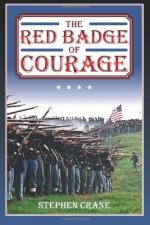|
|
The Red Badge of Courage Chapter 11
The youth heard the noises of battle growing louder, and as he rounded a hillock, saw hordes of retreating wagons, horses, and men. This gave him a sense of vindication in his decision to flee. Suddenly, a column of men appeared going the other direction on the road - they were rushing headlong toward the battle and threw the retreating ranks out of the way as they charged forward. The youth's heart dropped; he could have wept in his longing to be like these men whom he considered some type of chosen beings. He wondered how these men had attained such obvious greatness, and wished to switch perceived lives with one of them. This thought made him almost start toward their ranks to join them in their cause, but he stopped short, full of doubts. He debated with himself until he had been drained of his burst of courage.
Topic Tracking: Fear of Battle 7
For the first time, the youth attended to his body, and found that he had a scorching thirst and that every bone in his body ached. His feet pained him, and in his stomach he felt a deep, aching hunger. He felt weak and began to see green patches floating before his eyes. This convinced him even more fully of his incapacity as a true soldier. He stayed, however, near the battle like a moth to a flame. He wanted to know who had won. He acknowledged reluctantly that a defeat of the Union forces would be good for him; in the resultant splintering of the forces, no one would learn of his flight. In his hypothetical reverie, he saw that a defeated army could regroup in a matter of weeks and be ready to fight. The public would deride and ruin the general of the defeated army, but the youth told himself that he cared not at all about the generals and trusted the opinion of the public very little. Also, in a defeat, he could point to his early flight as the simple utilization of his superior powers of perception and thus be vindicated.
If the army went on to a glorious victory, however, he would be lost for any chance at a successful life - his badge of dishonor would hound him always. He wished he was dead again, but felt contempt for those already dead; even if they had died intending to flee or had been killed by chance, history would reward them with traditional accolades of glory. He discounted his vain hopes - he had been taught that the Union army could never lose, and he believed it. He began to think up a convincing lie about his battle experience to tell his comrades, but threw all of them out as flimsy and vulnerable. He imagined the scene of constant derision upon his return to camp. He imagined that he would become a new slang term for cowardice in the face of battle.




